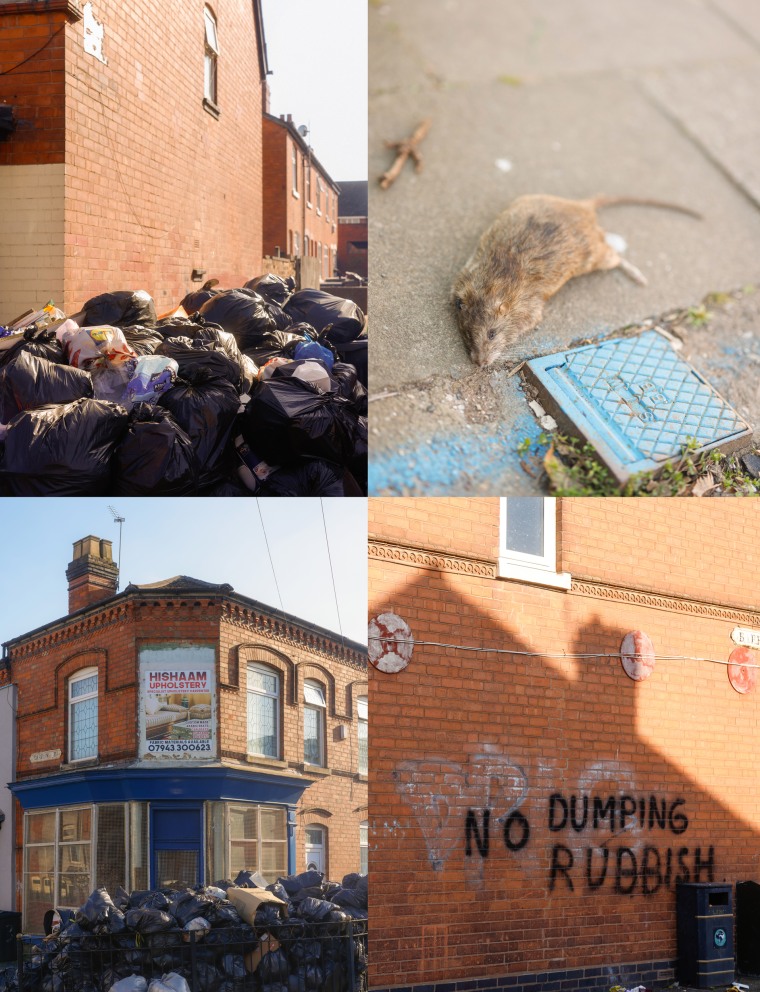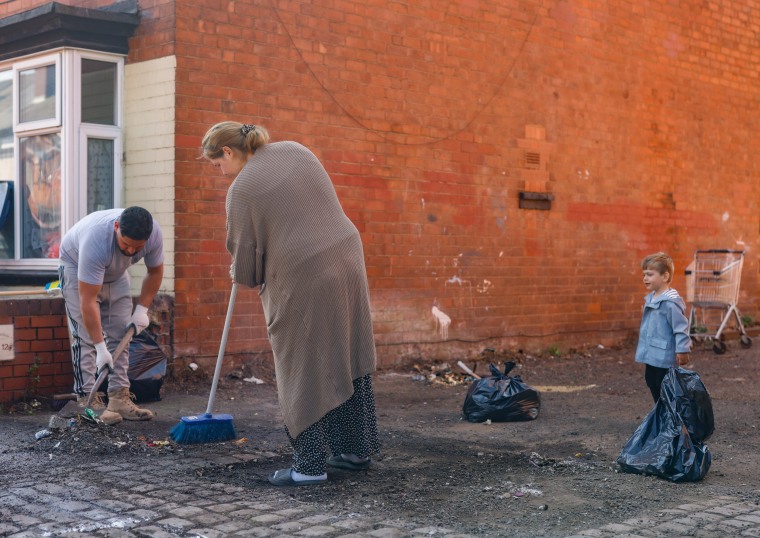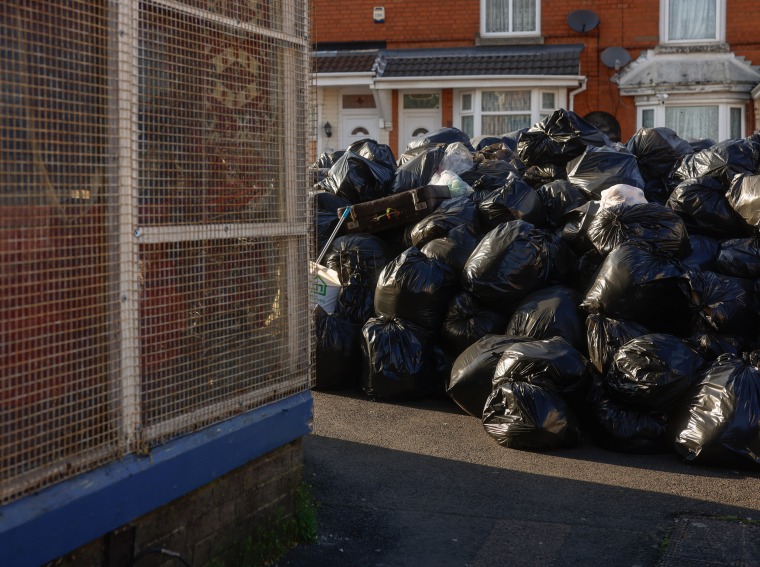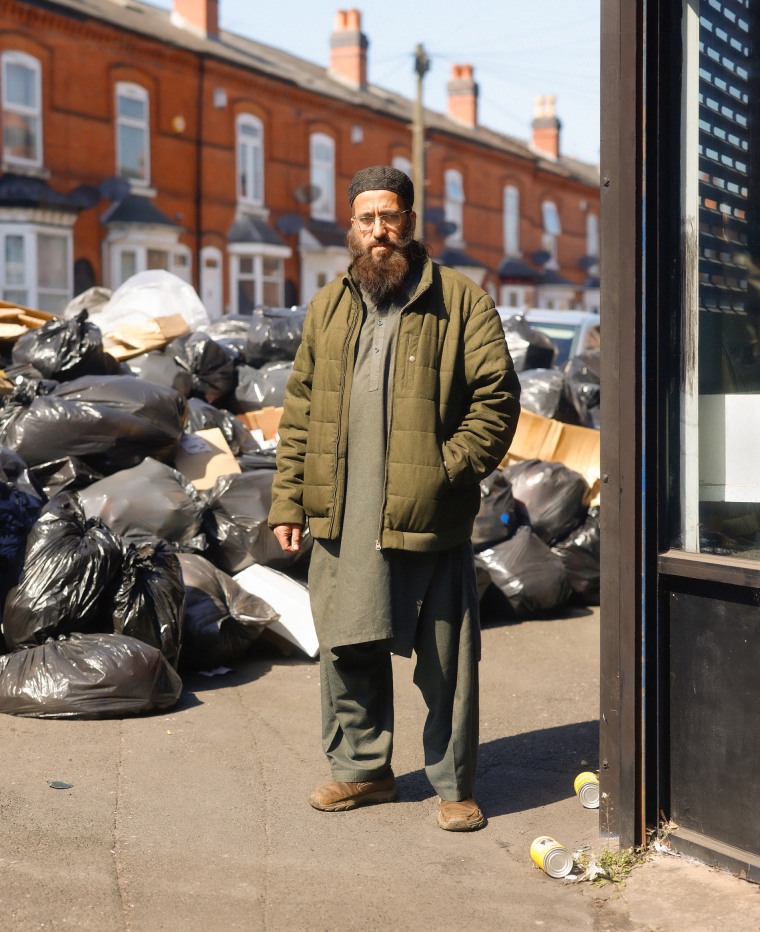BIRMINGHAM, England — A thick stench filled the air as Ghulam Murtaza Qureshi pointed to the huge pile of garbage rotting steps away from the entrance of his fast-food joint in Birmingham, Britain’s second-largest city.
“How can I open my shop now?” Qureshi, 49, told NBC News last week. “It’s a food business, and there’s rubbish everywhere.”
Worse than the pungent smell, he said, were the “rats and mice,” whose population has grown exponentially as the thousands of tons of waste have gotten bigger and bigger during a six-week standoff between striking garbage truck workers and the Birmingham City Council over pay. “It’s now a health issue,” Qureshi said.

So bad is the situation that local lawmakers declared a “major incident” this month in the city, where some residents say their quality of life is worse than in developing countries and hold it up as an example of “Broken Britain” — which is how some describe the perceived widespread social decay of the U.K. and the breakdown of public services in the country.“You’re not getting little rats anymore,” Charlie Wilson, 31, said as she sat on her front porch. “They’re getting cat-size.” She added that the smell — which has only gotten worse as spring temperatures have risen — was making her sick.
The dispute began in January after the Birmingham City Council decided to scrap the role of waste, recycling and collection officer (WRCO), offering either voluntary redundancy or lower-paid jobs to workers.

Unite, the union representing the garbage truck workers, has argued that the job is “safety critical” and that the cut would affect about 150 workers, some of whom would lose out on 8,000 pounds ($10,400) in yearly wages. Other workers would lose out on pay progression, the union said.On the picket line at a waste and recycling plant in Tyseley, fears about pay were clear among the striking workers, who walked off the job on March 11.
“If my wages drop and the rents keep going up, I could potentially lose my family home,” said Wendy Yarnold, 51, a single mom of three.
Her colleague David Callaghan, 57, said he’d worked as a refuse collector for more than three decades. “We love what we do, and we want to get back out to work. But we just want to be able to earn a fair day’s pay for a fair day’s work,” he said.

The council, meanwhile, has pointed out that the WRCO role does not exist in other councils and has disputed the number of staff members affected and the amount of money involved.“We stress that no worker need lose any money,” a spokesperson said in an email, adding: “All workers have been offered alternative employment at the same pay, driver training or voluntary redundancy. That offer remains open.”
The origins of the dispute date to 2023, when the council effectively had to declare itself bankrupt, partly as a result of equal pay cases brought by workers. It subsequently had to make budget cuts of around 300 million pounds ($393 million), and the cost-cutting was so severe that today, it is providing only services required by law, including waste collection.
In many ways, Birmingham, where 46% of children live in poverty — more than double the national average — is a microcosm of Britain, where economic growth has been stagnant since the Covid-19 pandemic, homelessness is on the rise, and public services and health care are crumbling.

After the Labour Party came into power last year after 14 years of Conservative rule, Prime Minister Keir Starmer, during his first speech on Downing Street, vowed to fix a country that had been drained of “hope, the spirit and the belief in a better future.” Last week, Starmer, whose party runs the Birmingham City Council and has traditionally been affiliated with unions, called the situation “completely unacceptable.”
There has been little sign that the situation will be resolved any time soon.
Some frustrated Birmingham residents have taken the problem into their own hands by driving to the Tyseley waste facility, where the strikes are ongoing, or other waste pits near the area to dispose of their garbage.
But Abdul Sami, 37, said that doing so requires residents to book a slot online and that so many had come up with the same plan that now hardly any slots are available to the public.

Letters of complaint had gone unanswered, he said, adding that in April the council tax, a local levy issued by the city, had “gone up, which obviously we have to pay.” Others like Solomon Zia, 38, said negotiators at the council need to evaluate their own worth before they looked at the garbage men. “Will those in suits come out and collect bins early in the morning?” he asked.
In the meantime, he was learning to live with the one population in Birmingham that is thriving.
“I’m a big lad,” he said. “But I’m afraid when it comes to mice and rats, I can’t do anything.”

